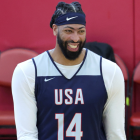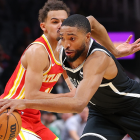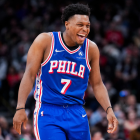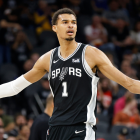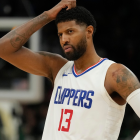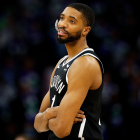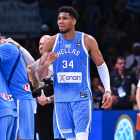
You know who Chris Matthews is even if the name doesn't quite ring a bell. If you've spent any time on the internet lately, you probably know him by 'Lethal Shooter.' Matthews has emerged as one of the premier skills coaches in all of basketball, working with NBA teams, WNBA teams and a long list of celebrities. His specialty, as you might be able to tell by his nickname, is shooting and he's absolutely taken over social media as a must-follow for his unreal shooting displays.
Matthews, a Washington D.C. native, played alongside Kevin Durant in high school before heading to Washington State to play his college ball. He eventually transferred to St. Bonaventure to finish his collegiate career and during his senior campaign, he set the school mark for 3-pointers made in a season. A stint in the G League and a number of professional leagues across the world were cut short by injuries, but that's when his new path began: helping others fine-tune the art of shooting.

CBS Sports HQ Newsletter
Your Ultimate Guide to Every Day in Sports
We bring sports news that matters to your inbox, to help you stay informed and get a winning edge.
Thanks for signing up!
Keep an eye on your inbox.
Sorry!
There was an error processing your subscription.
His latest project is helping the 3x3 Team USA squad get ready for the Olympics. Working alongside Red Bull, Matthews has joined the Team USA players out in Los Angeles and their training sessions are underway. Team USA is fresh off winning a gold medal in the 2019 FIBA 3x3 World Cup and is looking to take the gold as the sport makes its debut in the Olympics.
In an exclusive interview with CBS Sports, Matthews discusses how he's helping Team USA prepare for the Olympics, his basketball journey, the biggest names he's trained, his favorite sneakers to hoop in and who the greatest shooter of all-time is.
CBS Sports: You're huge on Social Media; people love to see what you're up to next. Now you're at the Red Bull 3X House helping the 3-on-3 Team USA get ready for the Olympics, what's it been like so far and how do you plan on passing along your knowledge?
Chris Matthews: These guys are real athletes. Just coming in here not knowing much about the sport but hearing a lot about it, I have a different type of respect for it. These guys are playing something that is very hard. For them to ask me to come and help with the art of shooting is an honor. It's been nothing but great energy, they're very receptive, they have high basketball IQs. I think America is doing a great job picking the best 3-on-3 players because these guys know how to read the game lightning fast.
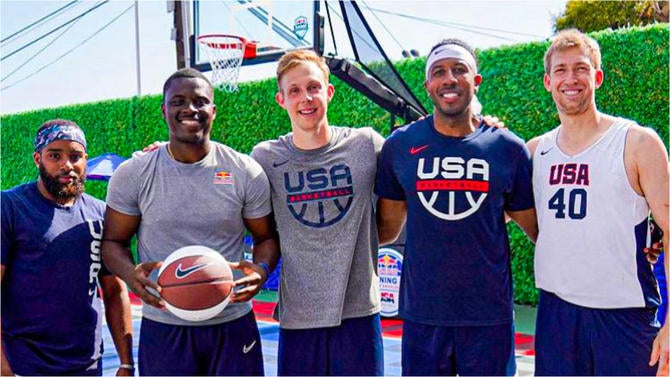
CBS: Canyon Barry is one of the players on Team USA. He's known for shooting his free throws underhand. As a shooting coach, what do you think when you see someone utilizing such a rare technique?
CM: Me and him have been having great sessions. I only changed a few things with his jump shot. With his free throws, I'm the type of coach that believes if it's not broke, don't change it. I feel like a lot of people have to understand that underhand, backwards, hook shot - if it's a good percentage you should stick with it. When I saw him shooting underhand when I got here, I wasn't alarmed at all because I saw how consistent it was, how consistent it was for his career and I'm a huge fan of different shooting mechanics at the free throw line if it makes you consistent. He's one of those unique guys in the basketball world that's still shooting underhand and I think that's legendary. I would love to see if somebody else takes on that trait.
CBS: Let's dive back a little bit. Ten years ago did you ever see this life for yourself?
CM: I wouldn't say 10 years ago because I was still hooping-hooping but as I noticed that I wasn't going to play anymore, yes. I saw nothing but success for myself because I believe in myself. Have I had down moments? Absolutely but I always had confidence in myself that I could do whatever I put my mind to because my parents did a good job of letting me know that the hard times lead to the great times. I feel like in today's society, with social media and things like that, a lot of people want instant gratification but they have to realize that if you want to be successful and leave a legacy out in the world it takes consistency every single day to lead to that greatness. When I stopped playing I kind of knew what I wanted for myself and I wasn't going to stop until I got there and I still haven't reached my full potential in life so I'm not satisfied still.
CBS: Growing up in Washington D.C., which is a basketball hotbed, how did that influence your basketball journey?
CM: Growing up in the DMV area is probably one of the best things to happen to me in my life. Delonte 'Nut' Taylor is one of my mentors that helped me with the art of shooting. Growing up in uptown D.C., growing up Langdon Park gave me that grit. These are areas where you can't be soft. When you grow up in the DMV area as an athlete it forces you to have heart. In high school, I played with Kevin Durant and different varieties of athletes and it helped me turn the curb faster as a young athlete because if you didn't bring your game back then you would get embarrassed.
CBS: You were a teammate of Kevin Durant in high school. Did you see this greatness in him at that time or has he managed to surpass all expectations even as a highly-touted prep player?
CM: Absolutely. I was blessed to see him in the 9th and 10th grade and I always knew that he was going to be great. He was just ahead of his time. I feel like he's one of those unique unicorns that God put on this earth and decided that he's just not going to be guardable and he's been like that since he was in the 9th grade. I always saw it in him because I saw the work that he was actually putting in at that age and I saw that he wasn't satisfied back then, he would go through some torturous workouts.
CBS: At what age did you realize that shooting was your specialty?
CM: The fifth grade. So my dad used to always make me shoot hook shots, he wouldn't let me shoot from afar. He would force me to form-shoot and shoot hook shots. And then when I got to the fifth grade, he changed my shot to my regular shot but I was form shooting so much that my shot was like a regular adult shot. Remember when I was younger and I would play with the adults all I would shoot was hook shots and the reason my dad did that when I was young is because he didn't want me just throwing the ball up. A lot of people make that mistake with their kids, they want them to try and shoot but they're literally throwing the ball at the rim. And that could set them back a few years, so I feel like with my dad making shoot hook shots at a young age and then switching me over in the fifth grade to shoot regular shots it was just more pure. And I always knew I was a shooter because all my coaches would tell me that if I passed the ball they would sub me out of the games.
CBS: On a normal day, how many shots do you get up?
CM: So right now as a trainer and as a coach it's very difficult for me to get up a lot of shots just because of what I do with teams and players. But on my downtime when I go to the gym I try my best to get up 300 shots. When I was in my prime I would try my best to make 500 shots and that's what I try to force my clients to do in the offseason. A good example is [Milwaukee Bucks forward] Bobby Portis right now he's No. 2 in the NBA in 3-point percentage. In the summer in Arkansas we would wake up at 7 a.m. and we would shoot, then for dinner we would shoot again. With all his elite trainers, we were forcing him to make 500 shots a day and I feel like that's the remedy. Anything in life that has reps and consistency leads to greatness. If you're a pro or if you're somebody that's trying to have an elite jump shot, it's unacceptable to not try and make 500 shots a day in the summer.
CBS: How has social media influenced your journey as a skills coach?
CM: One thing people have to understand about me is that the person on social media isn't what I do in real life. I'm a coach. I'm a coach for NBA teams, for WNBA teams and I'm a youth coach. But social media has given me an outlet to show my skills to shoot on inventive rims, on triangle rims on little 10-inch rims but that's not really who I am. The dad comes first, the family man comes first then second the coach and third comes Instagram. But it has helped me show my talents and it helps me sometimes put that validation out there like 'this is what I do.'
CBS: You've worked with a ton of celebrities and big-name athletes; who has been the one person that reached out to you for help that really left you surprised?
CM: I kind of look at all of them the same. I don't feel like anyone is bigger or better than the other but if I had to pick one I would say the biggest celebrity that I've probably trained was Drake. He hired me for a week because he wanted to change his jump shot. He was so focused. I thought this guy was just going to come in here and just go with the motions but he was very eager to learn and that's another reason why I respect him as well. When he came into the workouts he was trying to sweat, he was trying to get gritty so it was pretty fun training Drake.
CBS: How do you stay motivated to remain creative with your craft?
CM: You know usually in life when people start reaching a certain level they get comfortable and the one thing I do daily is I reset my mind. I go back and think about where I used to be, where my brand used to be so that helps keep me humble. In life when you start taking things for granted that's when you start easing up and I'm not looking to ease up until I retire so I'm always going to apply that pressure as if I'm still at the start because by doing that you're never going to let up toward your purpose.
CBS: You're in a hurry and have to get up and go; what's the first pair of sneakers you grab?
CM: Right now it's the Nike Adapt because I don't have to tie them up, I just hit the button and they close up.
CBS: What's your all-time favorite shoe to hoop in?
CM: I would say the Nike Huarache 2K4. I was a huge fan of those. I wore them at St. Bonaventure, I wore them at Washington State. It felt like your foot was in a pillow, I loved them.
CBS: I feel like you're the perfect person to answer this: Who is the best shooter in NBA history?
CM: Steph Curry. He can catch and shoot. He can come off the dribble and shoot. He can come off the pick-and-roll and shoot. There's not one thing with shooting that he can't do. There's a lot of elite shooters that came before him but a lot of those shooters weren't able to put the ball on the floor and pull up the way he pulls up. You have to literally guard him from half-court. So I say that Steph Curry is going to go down as probably the greatest shooter of all-time. And this might sound crazy as well: I don't think we are ever going to see something of this nature again. We've never seen something like this before.








